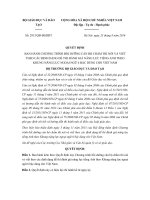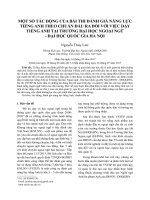Kỳ thi đánh giá năng lực tiếng Anh của Giáo Viên Tài liệu Speaking
Bạn đang xem bản rút gọn của tài liệu. Xem và tải ngay bản đầy đủ của tài liệu tại đây (6.32 MB, 30 trang )
SPEAKING
SOCIAL
INTERACTION
PART 1 – SOCIAL INTERACTIONS
SAMPLE QUESTIONS
Family
1. Describe your family.
2. Do you have a large or small family?
3. How many brothers and sisters do you have? What do
they like doing in their free time?
4. Can you tell me about your family?
5. What do your parents do?
Email
1. Do you send and receive email regularly?
2. Who do you usually communicate with?
3. How often do you check your email?
4. Do you think writing email has strengthened or
weakened people's writing skills?
5. What are some disadvantages of email?
Education
1. Describe your education.
2. What kind of school did you go to as a child?
3. What was your favorite subject as a child?
4. Who was your favorite teacher?
5. What is the education system like in your country?
The Internet
1. Do you use the Internet much during the day?
2. What do you usually do on the Internet?
3. What are some advantages of the Internet?
4. What are some disadvantages?
5. Do people in your country use the Internet a lot?
Travel
1. Do you like to travel?
2. What kind of places have you visited in your life?
3. Which place would you really like to visit? Why?
4. What's the best place you've ever visited?
5. Have you visited many foreign countries? What was your
favorite place? Why?
Marriage
1. What is the attitude toward marriage in your country?
2. Do most young people plan on getting married in your
country?
3. What are some of the advantages of marriage?
4. What are some of the disadvantages?
5. Is the divorce rate high in your country?
Hometown
1. Can you describe your hometown or village to me?
2. Tell me something about your hometown.
3. Where are you from?
4. Where is your hometown?
5. What's special about it?
Hobby
1. Do you have any hobbies? /What are your hobbies?
2. Have you got any interests or hobbies?
3. What are some of your hobbies?
4 . What are some of the advantages of having a hobby?
5. How much time do you spend on your hobby?
Free Time
1. What do you enjoy doing in your free time?
2. How much time do you have each week for doing these
things?
3. Why do you like doing these activities?
4. How did you start doing this activity at first?
5. Is there some other hobby or sport you would like to try?
Why?
Shopping
1. How much time do you spend shopping every week?
2. Do you enjoy going shopping? Why (not)?
3. How do you feel about shopping?
4. Do you like shopping on the Internet?
5. Which is the most popular place to shop in your
hometown?
Neighborhood
1. Can you describe the house where you live to me?
2. What is there to do in the area where you live?
3. What do you like about the area where you live?
4. How do you think it could be improved?
5. Do you think it is better to live in the centre of town or
outside in the country? Why?
Reading
1. Do you enjoy reading? Why?
2. What sort of things do you read?
3. What kind of books do you like to read?
4. Tell me something about your favorite book.
5. Where do you like to read?
Sports
1. Do you like sports?
2. Do you enjoy watching sports?
3. Do you enjoy participating in any sports?
4. How often do you participate in sports?
5. What equipment do you need for your favorite sport?
Games
1. Do you enjoy playing any games?
2. What kind of games do you play?
3. Do you think adults should play games?
4. What do children learn from games?
5. What kind of games did you play when you were a child?
Music
1. Do you like music?
2. What kind of music do you like?
3. When do you usually listen to music?
4. What kind of music did you like when you were younger?
5. What kind of music is popular in your country?
Clothes
1. What type of clothes do you like to wear?
2. What kind of clothes do people in your country usually
wear?
3. How important is fashion to you?
4. What kind of clothes do you dislike?
5. Do you think people behave differently in different kinds
of clothes?
Going Out
1. Do you like going out or staying at home?
2. What do you like to do when you go out?
3. How often do you go out?
4. Do people in your country go out a lot?
5. How and where do people in your country usually
socialize?
Celebrations
1. How do you usually celebrate your birthday?
2. How did you celebrate your last birthday?
3. How do you think you will celebrate your next birthday?
4. What is the most important day of the year for you?
(Why?)
Tourism
1. Which places would you recommend to a visitor to your
country?
2. Do a lot of tourists visit your country?
3. What do they usually do there?
4. How has tourism changed your country?
5. Is your country expensive for most tourists?
PART 2 – SOLUTION DISCUSSION
USEFUL EXPRESSIONS TO STATE YOUR OPINION
In my opinion, ...
In my eyes, ...
To my mind, ...
As far as I am concerned, ...
Speaking personally, ...
From my point of view, ...
As for me / As to me, ...
My view / opinion / belief / impression / conviction is that ...
I hold the view that ...
I would say that ...
It seems to me that ...
I am of the opinion that ...
My impression is that ...
I am under the impression that ...
It is my impression that ...
I have the feeling that ...
My own feeling on the subject is that ...
I have no doubt that ...
I am sure / I am certain that ...
I think / consider / find / feel / believe / suppose / presume / assume that ...
I hold the opinion that ...
(I form / adopt an opinion.)
I dare say that ...
I guess that ...
I bet that ....
I gather that ...
USEFUL EXPRESSIONS TO MAKE COMPARISONS
There are some rules to help you make comparisons in English.
1 If the adjective (describing word) is one syllable, you can add -er.
For example, small – smaller; big – bigger; nice – nicer.
2 If the adjective has two syllables, but ends in -y, you can change the end to -ier.
For example, lucky – luckier; happy – happier.
3 With other English adjectives of two syllables and more, you can't change their endings. Instead, you should use
more + adjective.
For example, handsome – more handsome; beautiful – more beautiful and so on.
4 When you compare two things, use 'than'.
"She's younger than me."
"This exercise is more difficult than the last one."
5 When you want to say something is similar, use 'as – as'.
For example, "She's as tall as her brother" or "It's as nice today as it was yesterday."
6 When you want to say one thing is less than another, you can either use 'less than' or 'not as – as'.
For example, "This programme is less interesting than I thought" or "This programme is not as interesting as I thought."
7 Remember that some adjectives are irregular and change form when you make comparisons.
For example, good – better; bad – worse; far – further.
USING QUALIFYING EXPRESSIONS
You can vary the strength of the comparison by using "qualifying" expressions.
1. Comparing two things
You can use "a lot", "much", "a little", "slightly" and "far" before "more / less than":
"She's a lot more intelligent than him."
"This car is much faster than the other one."
"They are much less wealthy than they used to be."
"He's a little taller than his sister."
"She's slightly less interested in football than him.
"We are far more involved in charity than they are."
When you use these qualifying expressions in English, remember the rules about using -er. If the adjective is one syllable,
or ends in -y, add -er:
"He's far taller than her." (NOT "He's far more taller…")
"I'm much lazier than you!"
When the adjective is two syllables and more, you need either "more" or "less":
"He's a little more prepared for the exam than she is." (NOT "He's a little prepareder…")
2. Saying how two things are similar
You can use "almost as … as", "not quite as … as", "(not) nearly as … as", "nowhere near as … as", "twice as … as" and "half as
… as" to change the extent of the similarity.
"She's almost as good as you!"
"He's not quite as confident as Susie."
"I'm not nearly as intelligent as her!"
"This painting is nowhere near as famous as the first."
"She's twice as old as him!
"He's half as interesting as you!"
EXPRESSING REASON
Examples:
Since you don't believe me, I won't give evidence.
Because of his lack of training he had difficulties finding a job.
He gave him his jacket out of pity.
On account of the weather we didn't go for a walk.
Billy was punished for lying to his teacher.
Owing to the snow,the planes couldn't take off.
As you are a foreigner you can't express your opinions on the situation in the area.
Seeing that you aren't interested I' ll do it by myself.
EXPRESSING RESULT
Examples:
He missed the early train, as a result he was too late for the job interview.
The result of his trial, therefore, could hardly have been other than a foregone conclusion.
If he locked the door, then Kitty is trapped inside.
SAMPLE QUESTIONS
1. Which do you think is the most entertaining or relaxing way of spending your free time: going to the beach, dancing, or
going to the cinema?
2. Which of the following TV programmes is the best choice for you: talent shows, comedy series, or sports programmes?
3. Which would be the best place to live for a family with children: a small town, a city centre, or a village?
4. Which of these issues do you think has the worst effect on the environment: deforestation, air pollution, or toxic waste?
5. Your friend is between his/her mind about choosing one of these sports: swimming, football and boxing? Which do you
think is the best for him/her?
6. A company is considering three methods of advertising their new product: TV commercials, online advertising, and
leaflets? Which do you think is the best choice?
7. Which do you think is the most beneficial activity for young people: cooking, playing computer games, or joining outdoor
activities?
8. Which of these presents would attract most people to participate in a competition: a smart phone, a camera, or a gift
voucher of the same value?
9. Which of these things would you most like to have in your room: a guitar, a laptop, or a video game console?
10. Which of these things could you happily live without: a guitar, a hair dryer, or an iron?
11. Your foreign friend is considering visiting one of the following places in Vietnam: Ha Noi, Hue and Saigon. Which would
you recommend to him/her?
12. Which of these jobs would you find the most interesting: a tour guide, a cook, or a teacher?
13. A group of high school students are considering the following places to visit: an art gallery, a history museum and a
science musem. Which do you think is the most beneficial for them?
14. You have been asked to give a talk to teenagers about health and safety. Which of these topics is the most important for
teenagers' health: stress, drug addiction or smoking?
15. A friend of yours has decided to enrol for evening classes at your local college. There are some suggestions for classes on
offer: hairdressing, photography and cooking. Which one do you think is the most useful for him/her?
PART 3 – TOPIC DEVELOPMENT
EXPRESSIONS OF ADDITION
When we want to add information to what we (or someone else) has said, there are a number of different words and
expressions that we can use.
Probably the most common and simplest two words to use are the adverbs too and also.
Too (adverb): (esp. at the end of a sentence) in addition, also
I’d like to come too.
You’ll need dictionaries – and bring a notebook too.
“I love Thornton’s chocolates.” “I like them too./INFORMAL Me too.”
Also (adverb): additionally
She’s a photographer and also writes books.
I’m cold, and I’m also hungry and tired.
The following words and expressions can also be used to add information:
Additionally (adverb):
We were additionally (=as well as everything else) faced with trying to find somewhere to stay at two o’clock in the
morning.
Additionally, we request a deposit of $200 in advance.
(And) another thing: is used to introduce one more in a series of arguments or complaints.
And another thing, why didn’t you tell me you were going out?
As well (as) (that): in addition (to)
Invite Emlyn – and Simon as well.
I want to visit Andrew as well as Martin.
He is rich and as well as that he’s generous.
EXPRESSIONS OF ADDITION
Besides (adverb, preposition): in addition to; also
Do you play any other sports besides ice-skating and darts?
She told me that she has two other cars besides the one she drives to work.
I’ve had job offers from two firms of international lawyers and plenty more besides.
She won’t mind your being late – besides, it’s hardly your fault.
Furthermore (adverb) FORMAL: in addition; more importantly
I suggest we go to the Italian restaurant – it’s very good and furthermore it’s very cheap.
I don’t know what happened to Rupert Ford and furthermore I don’t care.
In addition: You use in addition when you want to mention another item connected with the subject you are discussing.
The workers have not been paid for two months. In addition, we owe our suppliers £50,000.
Moreover (adverb) FORMAL: (used to add information) also and more importantly
It was a good car, and it was, moreover, a fair price they were asking for it.
On top of (that) : in addition to (esp. something unpleasant)
We missed the train, and on top of that we had to wait for two hours for the next one.
On top of his late arrival, he was drunk!
What’s more: (additionally and more importantly)
He won the race, and what’s more, he broke the world record.
CLARIFYING YOUR OWN IDEA
In other words,
What I mean is . . .
What I'm trying to say is . . .
What I wanted to say was . . .
To clarify,
SEQUENCE WORDS
First / firstly, second / secondly, third / thirdly etc
Next, last, finally
SAMPLE QUESTIONS
1. Cell phones are useful in many ways.
keep you
from getting
bored
could
save
your life
cell
phones
are a good
way to meet
people
1. Can people use their cell phones while they are driving in your country?
2. Do you think people should be fined for using their cell phone in a no cell phone area?
3. What was life like before cell phones?
your
own
idea
2. There are good reasons why Olympics games are popular.
Olympic athletes as good
role models for young
people
bring
people
together
Olympics
games
promote
healthy
lifestyles
1. What does hosting the Olympics do for a country?
2. In what way do the Olympic Games keep world peace?
3. Do you think that Olympic athletes are always good role models?
your
own
idea
3. Early marriage is not a good idea.
may have a bad effect on
one's professional life
has a
higher risk
of divorce
early
marriage
offers women
little chance of
working outside
the kitchen
1. Should people stay married if they no longer love each other?
2. What do you think of the idea of no sex before marriage?
3. How do you think marriage changes people?
your
own
idea
4. We should do more to stop people smoking and drinking.
are a waste
of money
are
unhealthy
smoking
and
drinking
cause
problems
in society
1. Why do you think it is so difficult for people to give up and quit smoking ?
2. What can we do to stop children smoking?
3. Do you think smoking will ever disappear?
your
own
idea
5. Everybody should learn English.
official language in
more than sixty
countries
more career
and education
choices
WHY?
an ultimate
tool of
communication
1. Do you think English is more or less difficult than your language?
2. What's more important: speaking, reading, writing or listening?
3. Should people worry about making mistakes in English?
your
own
idea
6. We should try to limit traffic in city centers.
traffic
congestion
Air
pollution
WHY?
better
quality of life
1. What form of transport is worst for the environment?
2. What transportation problems are there in your country/area?
3. What will the transportation of the future be like?
your
own
idea









